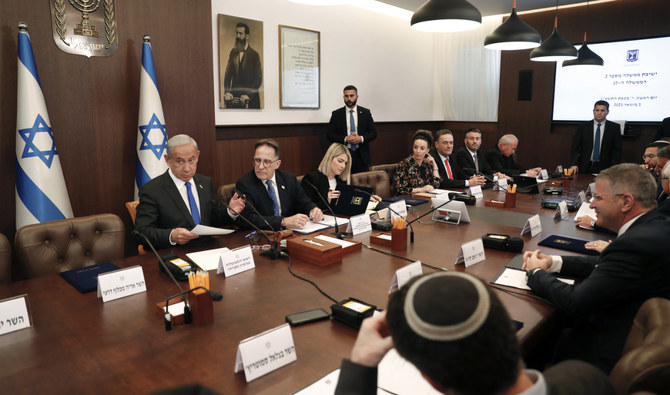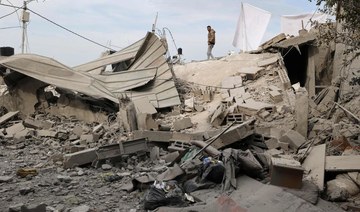RAMALLAH: The new Israeli government headed by Prime Minister Benjamin Netanyahu is seeking to restore close ties with Russia in a bid to counter Moscow’s increasingly friendly relationship with Iran, analysts say.
At least one observer believes Russia’s support for Iran could pose a future threat to Israeli security operations against Iranian targets in Syria.
On Jan. 3, Israeli Foreign Minister Eli Cohen, after a phone call with his Russian counterpart Sergey Lavrov, asked his Cabinet colleagues to avoid commenting on the Russia-Ukraine conflict.
He said that the new government will talk less about the war, meaning Israel will avoid denouncing Russia’s aggression in Ukraine, a shift away from the stance adopted by former prime minister Yair Lapid.
“It’s clear that the relations between Netanyahu and Russian President Vladimir Putin are much warmer for many years than those between Lapid and former Israeli premier Naftali Bennett with Putin,” Ksenia Svetlova, a senior non-resident fellow at the Atlantic Council and former member of the Israeli parliament, told Arab News.
Netanyahu is also believed to be unhappy with President Volodymyr Zelensky over Ukraine’s failure to oppose pro-Palestinian resolutions at the UN last week.
Putin has worked with Netanyahu for 12 of the 22 years he has been at the helm in the Kremlin, and the two have a close relationship.
The Russian president called Netanyahu to congratulate him on winning the Nov. 3 election and again after the Israeli leader won a confidence vote on Dec. 29.
Israeli experts told Arab News that the Netanyahu government will work to develop close ties with Moscow, but at the same time maintain strategic links with the US, which expressed displeasure over the Cohen-Lavrov call.
Israeli political analyst Yoni Ben Menachem said that Putin expects Netanyahu to shift Israel’s Russia policy away from the approach taken by Lapid, who attacked Moscow in his UN speech and media statements.
Israel fears Moscow may prevent it from continuing to bomb Iranian targets in Syria. Russia might provide anti-aircraft missiles to Iranian forces that would pose a threat to Israeli warplanes.
Russia now enjoys “a very close relationship” with Iran to the extent that it may end the freedom given to the Israeli airforce to bomb Iranian targets in Syria, Ben Menachem said.
There are 1 million Russian Jews in Israel who speak Russian. Most are over 18 and vote and influence Israeli elections.
Previous Israeli governments included ministers and deputy ministers of Russian origin, such as Avigdor Lieberman, Yuli Edelstein and Sophia Lander.
On Dec. 31, Netanyahu spoke with Zelensky and asked him to oppose pro-Palestinian resolutions at the UN. Zelensky said he would agree if Tel Aviv provided Ukraine with advanced weapons. Netanyahu rejected the offer and told Zelensky that Israel could not supply Ukraine with more than humanitarian aid for fear of spoiling Tel Aviv’s ties with Moscow. Ukraine was absent from the voting session and avoided voting against Israel.
Zelensky hoped to receive air defense systems from the Lapid government, but these failed to arrive. It is unlikely Netanyahu will supply the systems.
“In any case, Israeli-Russian relations would be better between Netanyahu and Putin than they used to be between Lapid and Putin,” Svetlova told Arab News.
Alexander Grinberg, an expert on Russia-Israel affairs, told Arab News: “I am sure that Netanyahu will be able to balance Israel’s position and its relations with Russia with the continuation of the war in Ukraine, as the position of his predecessor Yair Lapid in support of Ukraine was personal and emotional, nothing more.”
He said Netanyahu’s position on Russia was consistent with the Israeli army, Military Intelligence Directorate, and the rest of the Israeli security apparatus regarding Israel’s security interests concerning Tehran, whether in Syria or inside Iran.
“The Israeli people stand against Russia on the war in Ukraine, while the political and security leadership cooperates closely with Putin,” he said.














